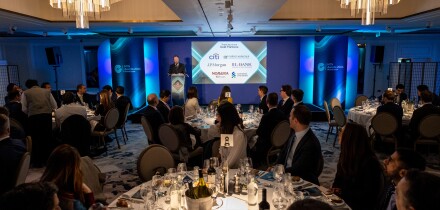Across several areas of the interest rate derivatives business, Nomura distinguished itself from the competition in the past year, not only stepping in to provide clients with crucial liquidity, but also supporting them with a valuable mix of timely and authoritative advice and market-leading structuring and execution capabilities.
It is for these reasons, together with the investment bank’s ability to maintain market-share, partly by executing innovative interest rate swap solutions when low-margin flow became the greater focus of many competitors, that Nomura is GlobalCapital’s Interest Rate Derivatives House of the Year.
For Darren Shames, managing director and co-head of G10 global rates sales in New York, the quality of the bank’s analysis and advice on the cessation of Libor and transition to Sofr-based products is one area in particular where Nomura has excelled, ultimately separating it “as a thought leader in this critical transition.”
Our clients have depended on us for analysis, guidance and advice, separating us as a thought leader in this critical transition.

Achieving that is not easy in a market awash with research and analysis on the subject. Yet, Shames believes Nomura has done so, essentially becoming the go-to firm among clients for good, insightful market analysis and advice on one of the largest and most critical issues impacting global finance.
Such intel can be invaluable, just as liquidity is for clients, too. And there, during the pandemic, Nomura’s ability to help its clients “manage through tough conditions, providing liquidity during the most difficult of times, has been another area where we have really stood out,” says Shames.
Ultimately this is just as true in the swaps market as it is in swaptions, where the bank has played and equally supportive role in providing the “type of liquidity that clients need and come to us for,” says Ali Khan, managing director and head of euro and dollar non-linear rates market making.
He believes one of the mains reasons why Nomura can step-in to facilitate large flows, in an era when warehousing risk is increasingly difficult, is because they run a “connected business across rates options,” which he believes is unique.
This means there is “one, integrated team in London and New York covering vanilla and exotic options in euros and dollars,” says Khan. “Such connectivity is a core strength.”
Clearly such a set-up enables the bank to provide the type of liquidity some rivals are unable to. It also undoubtedly helps Nomura innovate and structure original swap solutions.
There is one, integrated team in London and New York covering vanilla and exotic options in euros and dollars. Such connectivity is a core strength.

Across the year, Nomura has been involved in a number of firsts and innovations on and around relatively common derivative structures. For instance, the bank printed the first Sofr market swaption and also had great success in the skew and exotic space where we “delivered solutions to clients where we took advantage of RV between high strike Euribor caps, constant maturity swap caps, and CMS spread option caps, which provided neat and limited-downside macro trades,” says Khan.
The bank also delivered a basket of swaptions against an exotic swaption as a curve play in a sell-off scenario. “We were able to do this in good size across euros and dollars and the key to the client pulling the trigger was the clear analysis of risk/reward we were able to provide,” Khan adds.
Nomura was also especially active on inflation risk, where, for example, it sourced, restructured and delivered a bespoke inflation derivatives package to match the LPI [Limited Price Indexation] liabilities of a major UK insurer. Ultimately, a coordinated effort between insurance sales, structuring and the structured inflation trading desk enabled Nomura to successfully restructure and recycle the difficult LPI risks of the insurer into “an alpha-generating opportunity for a global real money client,” says Toby Huth-Wallis, an executive director on the inflation trading desk.
Such ingenuity, and ability to execute, is powerful. Augmenting this is how Nomura is leveraging its quantitative investment strategies platform to provide valuable investment solutions to clients. An important aspect of that is “the ability of the platform to generate historically relevant data that can prove to real money clients that certain types of investment strategies are actually effective,” says Tina Rydberg, managing director, head of Nordic global markets sales, and head of quantitative investment strategy sales, EMEA.
An important aspect of the QIS platform is its ability to generate historically relevant data that can prove to real money clients that certain types of investment strategies are actually effective

One such strategy is in the “rates volatility space, where we have worked out how to generate historical data sets that can prove that certain types of strategies are actually good and sensible,” adds Rydberg.
Combining these with other successes and its clear 2021 has been stellar for the bank’s rates business, and due primarily to the team’s collective effort and expertise in providing best-in-class advice, solutions, and liquidity to the market.
Another critical piece to the business’ success is the depth and diversity of its client franchise. “It is that that really allows us to warehouse and ultimately recycle risk between different types of institutions, whether it's pension funds, asset managers, hedge funds,” says Shames.
“It's really about understanding their core businesses, what risks they're interested in obtaining or mitigating, and working within that client ecosystem to recycle risk in an intelligent way, that ultimately benefits our clients.”






